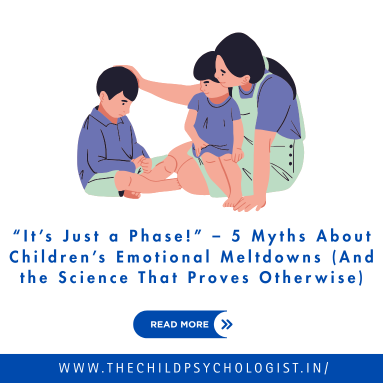Every parent has heard it: “Don’t worry, it’s just a phase.” But what if your child’s frequent meltdowns are not just about “bad behavior,” but a signal that their brain is overwhelmed?Let’s uncover 5 common myths about children’s emotional meltdowns and the truths backed by neuroscience and child psychology. According to the Yale Child Study Center, children who experience repeated overwhelm without adult support are more likely to face challenges like anxiety, ADHD, or impulse-control issues later in life.When your child cries, screams, or lashes out often, it isn’t always “naughtiness.” It could be their brain’s fight-or-flight system in overdrive — and they need your guidance to calm it. Research shows that soothing responses from caregivers help children form strong self-regulation skills. Neuroscientist Dr. Allan Schore (UCLA) found that emotionally attuned parenting strengthens the prefrontal cortex, the brain area responsible for self-control and emotional awareness.Children left to “cry it out” often shut down emotionally, lose trust, or develop hidden anxiety — the opposite of resilience. Children act out when they feel disconnected, especially after school, during transitions, or after being scolded. Responding with presence instead of punishment sends a powerful message:“You matter to me, even when you’re upset.” Studies show that harsh punishment increases cortisol (stress hormone) levels in children, which can affect brain development.The Harvard Center on the Developing Child warns:“Toxic stress without supportive adults can weaken brain architecture and affect lifelong health.”You may feel you “turned out fine.” But imagine the potential you could have reached with more emotional safety. Far from weakening authority, saying sorry when you overreact teaches children: Conflict repairHumilityHealthy emotional boundaries Dr. Dan Siegel emphasizes that this is the foundation of emotional intelligence and future relationship success. Name your child’s emotions: “I see you’re really angry right now.”Stay calm first, guide later.Avoid yelling — regulate yourself to help regulate them.Reconnect after misbehavior, don’t withdraw love.Seek professional support if meltdowns are frequent or extreme. Your child is not “too sensitive” — their brain is still under construction. Instead of labeling meltdowns as “misbehavior,” try asking:- “What is my child trying to express?” – “What do they need from me right now?”Behind every emotional outburst is a child saying: “Help me, I’m overwhelmed.” At Urjasvini Child Development Center, Indore, we provide evidence-based emotional coaching, child therapy, and parenting sessions to help families thrive.📞 Call Dr. Vini Jhariya: 7999215093 | 9893371516 📍 Visit us: 100-A, First Floor, Baikunth Dham Colony, Old Palasia, Indore, Madhya Pradesh 452018 🔗 Follow us on Instagram for more parenting insightsMyth 1: “All kids throw tantrums. It’s normal. Just ignore it.” The Truth: Tantrums are common, but frequent meltdowns may signal emotional dysregulation.
Myth 2: “Let them cry it out. They’ll toughen up.” The Truth: Support builds strength — neglect builds stress.
Myth 3: “He’s just seeking attention!” The Truth: Attention-seeking = Connection-seeking.
Myth 4: “I was punished harshly, and I turned out fine.”The Truth: Harsh discipline reshapes the brain.
Myth 5: “Saying sorry to a child weakens your authority.” The Truth: Apologies build trust and resilience.
What Parents Can Do Instead:
Final Thought
Need Help Understanding Your Child?
